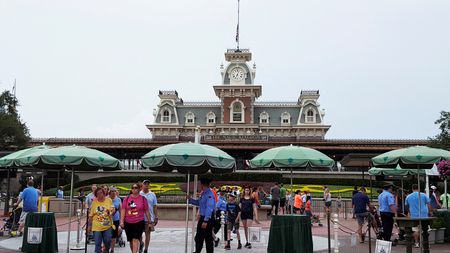 1
1 1
1


By Maria Caspani and Dawn Chmielewski
(Reuters) -Florida lawmakers gave legislative approval on Thursday to a bill stripping Walt Disney Co of its designation as a self-governing entity in an apparent response to its opposition to a new state law limiting discussion of LGBTQ issues in schools.
Approval from Governor Ron DeSantis, a potential 2024 Republican presidential nominee who fiercely backs the ban on classroom instruction on sexual orientation and gender identity for children under age 9, is the final step to the bill’s enactment.
Disney came under fire last month by many in the LGBTQ community and some employees for initially failing to publicly oppose the legislation, but then condemned it and said it would pause all its political donations in Florida.
Several Republican-controlled states have made moves to restrict rights, often focused on transgender people, in battles that have pitted them against Democrats, ahead of Midterm and other elections later this year.
DeSantis, in a surprise move, had asked lawmakers to consider the legislation during a special session he called this week. It was filed and passed within just three days.
“By trying to bring California values to Florida, Floridians have said, ‘All right, you’re a guest in our state. Maybe you don’t deserve special privileges anymore,'” the lead sponsor of the bill, Republican state Representative Randy Fine, told CNBC.
The Republican-led state House in Florida voted 70-38 to do away with a special tax district created by a 1967 law that allows Disney to self-govern the roughly 25,000-acre Orlando area where its Walt Disney World theme park complex is located.
DeSantis, an ally of former President Donald Trump who has also courted conservative voters on issues such as immigration and abortion ahead of a possible White House bid, did not immediately comment on the bill’s passage.
Disney declined to comment.
The law would eliminate a handful of special tax districts including the Reedy Creek Improvement District https://www.rcid.org that covers about 25,000 acres in Orange and Osceola counties.
That structure makes Disney, which is one of the state’s largest private employers, and other landowners responsible for providing services such as fire-fighting, power, water and roads. They in turn get relief from taxes and fees.
The change would go into effect in June 2023.
WHOM WILL IT HARM MOST?
Walt Disney World in Orlando, Florida, is the company’s largest theme park. Its sprawling businesses also include movie studios, broadcast and cable television networks, streaming services, cruise lines and retail products.
Disney has historically been a major political contributor in the state.
In the 2020 election cycle, the company donated $4.8 million in total, including campaign funds to more than 100 individual Florida legislative members, some of whom sponsored Thursday’s legislation, state records show.
The company also gave more than $900,000 to the state Republican party and more than $550,000 to the Republican senatorial campaign committee, along with $300,000 to the state Democratic party and $50,000 to DeSantis.
But its opposition to the new law, which was signed last month and dubbed “don’t say gay” by opponents, set off a storm of condemnation against the company by many Republicans.
Advocates have repeatedly cited parental choice.
It takes effect on July 1 and also prohibits such teaching that “is not age appropriate or developmentally appropriate” for older students. It is being challenged in court.
But it is unclear how the change will impact either Disney or the area financially.
The special tax status is believed to have benefited the company but it is also a contributor to the state’s coffers and local employers with around 70,000 staff.
The Walt Disney Resort paid $780.3 million in state and local taxes in 2021, according to a fact sheet commemorating the 50th anniversary of the theme park.
Disney already received many of the benefits from the special district in getting the park built and could come out ahead financially by shifting the cost of maintenance and services to the local jurisdictions, said David Ramba, executive director of the Florida Association of Special Districts.
However, Disney would likely want to maintain control in order to preserve its image because its roads and fire houses are kept to higher standards than those of surrounding Orange and Osceola counties, Ramba said.
“They (Disney) get to control the level of service versus leaving it to a county government,” Ramba said.
(Reporting by Maria Caspani in New York, Dawn Chmielewski in Los Angeles, Joseph Ax in Princeton, N.J., and Dan Trotta in Carlsbad, Calif.Writing by Costas PitasEditing by Leslie Adler and Matthew Lewis)